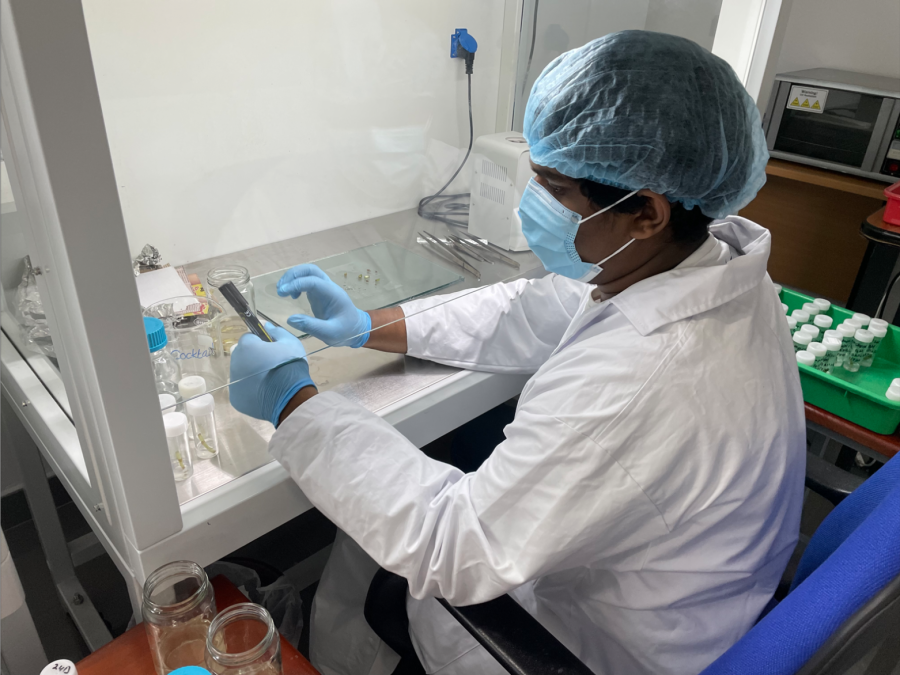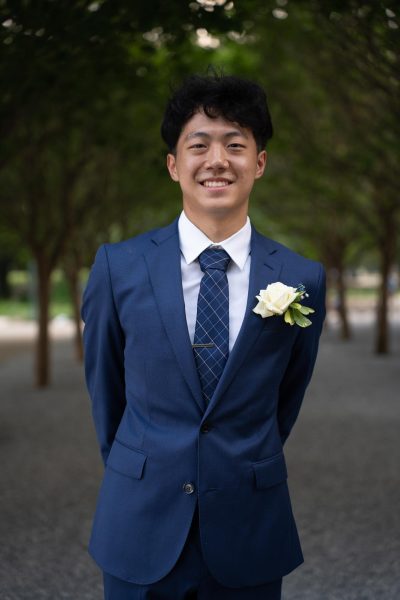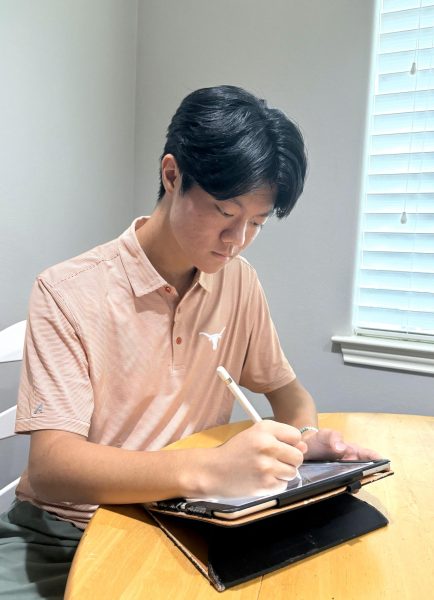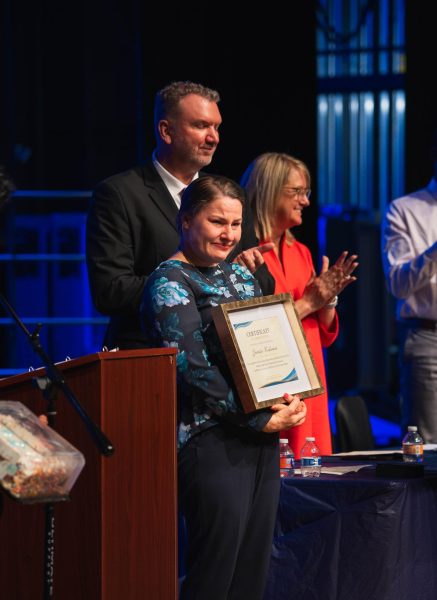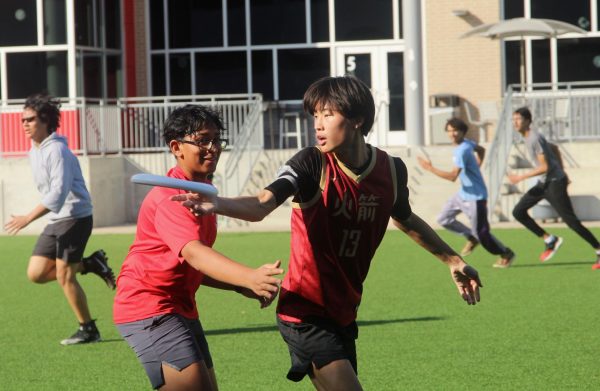Early bloomer: Senior completes five years of lab research at top university
Provided by Nethupa Arachchi
Senior Nethupa Arachchi labels the plant for his disinfecting experiment. He said using different type of plants for the research help with testing the effectiveness of the products on a wider range of plants
The bell rings. He bolts into his car and drives straight to Rice University. He runs to his lab. The scent of sanitizers and soil invades his nose when he enters.
On either side of him, rows and rows of neatly labeled plants line up on the shelves.
The sun has departed from the horizon, yet the scent of chemical disinfectant still lingers on the tip of his nose as he carefully places the dissected stem of the Scindapsus plant onto the petri dish.
Senior Nethupa Arachchi has lost track of time.
“During the time I was writing report papers for my lab, I would go to Rice University right after school, and I would stay there until around 7 p.m. and then come back home,” Arachchi said. “It would be stressful at times, but you don’t even feel the time go by.”
In 2018, equipped with an imaginative mind of a 13-year-old and a passion for exploring the world of science and nature, Arachchi began his research on finding a solution to reduce the use of harmful chemicals when disinfecting plants.
“I was always into research, and I was always amused by the world of science,” Arachchi said. “Then, one time I saw that a huge portion of the plants die due to the harmful chemicals, [in disinfectant] so my mom encouraged me to research to find a better disinfectant for plants without using a harmful chemical.”
In the beginning of his research, Arachchi used the process of micropropagation to cultivate plants and measured the chemical’s productivity rates. The result was that material with Clorox ingredients killed over 60% of the plants before they reached maturity. In exchange for this ingredient, he tested the use of ilmenite, which showed a positive outcome.
“My team and I decided to do a small experiment,” Arachchi said. “We used ilmenite as a photo catalyst, and then we applied it to the tissue culturing of the plants. We found an 85% increase in production after that.”
To Arachchi, his research used to only be a part of his ninth grade school project. However, he soon earned a chance to develop his passion at the Sri Lankan Institute of Nanotechnology, where he would work with nanotechnology to make nano compounds and experiment with different chemicals on plants.
“In the Sri Lankan Institute of Nanotechnology, we made the compound nano and developed it. Then we tried to experiment multiple times before we started writing the paper and publishing,” Arachchi said. “We then proposed our theory to the president of the material sciences and nanotech engineering faculty at Rice University, and after a while we were able to have a partnership with them.”
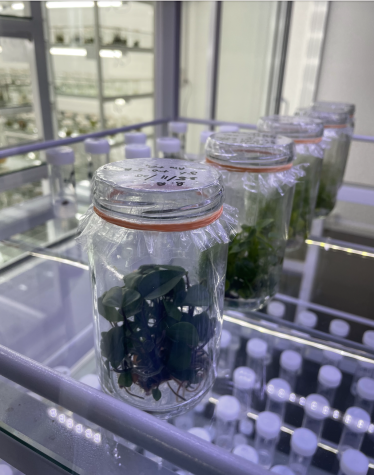
Despite facing challenges from machines malfunctioning to mixing up different chemicals in the experiment, Arachchi said he enjoyed every part of it.
“On my first reading, I actually messed up the concentrations so the whole thing was wrong, and we got an efficiency below 40%,” Arachchi said. “It was really bad because out of 100 plants per batch, we lost over 70% of the plant. Later on, we went on to make tiny tweaks to the compound, and after using the right concentrations, we were able to get an 85% efficiency. I was overjoyed, but this was after like six hours in the lab, so it was more like an exhausted happiness.”
However, the exhaustion he faced repeating experiments in the lab led to a deeper understanding of chemistry.
“School chemistry set the foundation of science for me to proceed in this research,” Arachchi said. “But on top of school, through experimenting, some of the knowledge I learn surprises me. Self research also helped me develop a full understanding about the procedure of the testing.”
Besides gaining knowledge about chemistry, Arachchi said he also attained the skill of time management.
“Since it is something that I love doing, I worked on it despite it being extremely time consuming,” Arachchi said. “That becomes one of the challenges because I have to balance school work too. I would say it’s all about time management. I usually set times where I would do my schoolwork, and then I would move on to my lab work. My supervisors and my team were also very helpful with helping me in balancing the workload in the lab.”
Arachchi met his teammates for the first time when he started the partnership with Rice University. To him, they were crucial in his research journey, and he was able to connect and create many great memories.
“The director of the research lab assigned me a supervisor and a team who would help me when I started working on the project,” Arachchi said. “Most of the fond memories I have is working with my team in the labs. We would always joke around and listen to music while we performed the experiments, which was very enjoyable. It usually would be small things like going for coffee or taking a two–hour long lunch that make my day.”
Arachchi wishes to further continue his research when he goes to college.
“I am planning to go to Rowan University for college, so I am currently summing up my work at Rice and hopefully I can move my work to the university and continue them,” Arachchi said. “I actually plan to do even more research during college.”
For Arachchi, research is his future. He said his attraction to science brings him to researching, but researching helps to deepen his passion for science.
“What helped me to work in this lab is basically my attraction to chemistry and research itself,” Arachchi said. “It’s something that I know that I’m meant to be doing, so when I get that feeling, I just want to find more. I would always tell other students that if you’re passionate about a certain subject, you should go for it because I can guarantee, it’s always a fun journey.”
Your donation will support the student journalists of Bellaire High School. Your contribution will allow us to purchase equipment and cover our annual website hosting costs.


